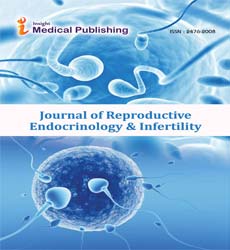General Clinical Experiences in Reproductive Endocrinology
Sultan T. Al-Otaibi
Sultan T. Al-Otaibi*
Department of Public Health, College of Public Health, Imam Abdurrahman Bin Faisal University, Dammam, KSA
- *Corresponding Author:
- Sultan T. Al-Otaibi
Department of Public Health, College of Public Health, Imam Abdurrahman Bin Faisal University, Dammam, KSA
E-mail: salotaibi@iau.edu.sa
Received Date: November 01, 2021; Accepted Date: November 09, 2021; Published Date:November 15, 2021
Citation: Al-Otaibi ST (2021) General Clinical Experiences in Reproductive Endocrinology. J Rep Endo Infert. Vol.6 No.6: 35.
Editorial
The three-year Reproductive Endocrinology and Infertility Fellowship at Mayo Clinic enable you to assume full clinical responsibility as a reproductive endocrinologist, perform advanced research and become an independent investigator in the field of reproductive physiology.
The first year of the fellowship involves intense clinical training in reproductive endocrinology, andrology, and reproductive surgery, with ample opportunity to prepare for research in the subsequent two years.
The second year is devoted to research and didactic instruction in basic science, while the third year continues to emphasize research and also provides focused clinical training in reproductive, medical and pediatric endocrinology, as well as genetics.
The first year of the Reproductive Endocrinology and Infertility Fellowship provides general clinical experiences in reproductive endocrinology. You spend 90 percent of your time in the Division of Reproductive Endocrinology and Infertility.
As you manage patients under close supervision by consultant staff, you develop clinical and surgical skills related to: Infertility, Amenorrhea, Abnormal uterine bleeding, neuroendocrine dysfunction, Reproductive tract abnormalities (acquired and developmental), Androgen disorders, recurrent abortion, Menopause
You also participate in the multidisciplinary Mayo Clinic Assisted Reproductive Technology (MCART) Program, which offers in vitro fertilization (IVF), gamete micromanipulation, assisted hatching and embryo-cumulus cell culture techniques, embryo cryopreservation, and oocyte donation.
The MCART Program experience prepares you for a clinical practice in reproductive endocrinology through extensive experience in sonography, sonohysterography, controlled ovarian hyper stimulation, transvaginal ultrasound-directed oocyte retrieval, and ultrasound-guided embryo transfer. Through the MCART Program, you also learn medical and surgical treatments of male infertility, including epididymis aspiration, testicular biopsy, and electro ejaculation in collaboration with the Department of Urology. All infertility care is supervised by a reproductive endocrinologist, who works closely with an urologist and a medical andrologist.
During the MCART Program experience, you fulfill specific learning objectives pertaining to IVF laboratory and andrology laboratory procedures. You study: Quality control testing of culture media, surgical items and lab ware, Culture media and sperm preparation for IVF Egg retrieval and insemination, Fertilization evaluation, Embryo culture and transfer and assisted hatching Cumulus cell culture techniques, Blastomeric biopsy, Preparation for pre implantation genetic diagnosis and embryo cryopreservation, Semen analysis, anti-sperm antibodies, cryopreservation and thawing of semen, and sperm washing
The remaining 20 percent of your first year (one day each week) is spent participating in didactic activities and preparing a research proposal. Initially, you visit the laboratories of research investigators to develop a specific research interest with an individual mentor. Then, you prepare a grant proposal according to National Institutes of Health guidelines. Your proposal is reviewed by members of the Mayo Clinic scientific community no later than the end of the first program year.
In the second year, you spend 80 percent of your time in researchrelated activities, where you gain a further understanding of the latest scientific techniques.
You continue to attend mandatory graduate school courses, which prepare academicians and independent investigators. Your continued participation in the MCART Program a half day each week provides ongoing training in assisted reproductive technology.
To provide a continuous 18-month research experience throughout the second and third years, you continue to spend 60 percent of your time in research-related activities. You have one three-month elective in research or clinical medicine (depending on your individual needs and interests) as well as three separate one-month rotations in medical endocrinology, pediatric endocrinology and medical genetics (if these have not been completed earlier).
Throughout the third year, you spend 40 percent of your time as a junior faculty member in the Reproductive Endocrinology and Infertility Clinic, where you get complete up-to-date training in assisted reproductive technology and teach junior colleagues to develop those skills.
Open Access Journals
- Aquaculture & Veterinary Science
- Chemistry & Chemical Sciences
- Clinical Sciences
- Engineering
- General Science
- Genetics & Molecular Biology
- Health Care & Nursing
- Immunology & Microbiology
- Materials Science
- Mathematics & Physics
- Medical Sciences
- Neurology & Psychiatry
- Oncology & Cancer Science
- Pharmaceutical Sciences
